Cinema Verite Blu-ray Movie
HomeCinema Verite Blu-ray Movie 
HBO | 2011 | 90 min | Rated TV-14 | Apr 24, 2012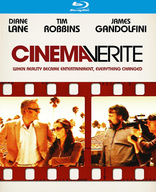
Movie rating
7 | / 10 |
Blu-ray rating
| Users | 0.0 | |
| Reviewer | 4.0 | |
| Overall | 4.0 |
Overview
Cinema Verite (2011)
Docudrama about the making of the first "reality TV" show, a ten-part PBS documentary offering an inside look at the life of an American family.
Starring: Diane Lane, Thomas Dekker, Tim Robbins, James Gandolfini, Johnny SimmonsDirector: Shari Springer Berman, Robert Pulcini
| Drama | 100% |
Specifications
Video
Video codec: MPEG-4 AVC
Video resolution: 1080p
Aspect ratio: 1.78:1
Original aspect ratio: 1.78:1
Audio
English: DTS-HD Master Audio 5.1
French: DTS 5.1
Spanish: DTS 5.1
Subtitles
English SDH, French, Spanish
Discs
25GB Blu-ray Disc
Single disc (1 BD)
Playback
Region free
Review
Rating summary
| Movie | 4.0 | |
| Video | 4.0 | |
| Audio | 3.5 | |
| Extras | 2.5 | |
| Overall | 4.0 |
Cinema Verite Blu-ray Movie Review
Verity, Verity, All Is Verity
Reviewed by Michael Reuben July 25, 2012An introductory title card for the HBO original film Cinema Verite lists three important historical events from 1973, all of which will celebrate their fortieth anniversary next year. Two of them, the U.S. withdrawal from Vietnam and the Supreme Court's decision in Roe v. Wade, remain familiar, even if people don't remember the exact year, because their consequences are still being felt. The third event has had an impact of equal magnitude, but its effects have been so thoroughly absorbed into American culture that people are no longer aware of the source. The event was the TV series, An American Family, which aired on PBS in ten parts from January 11 through March 29, 1973. From today's vantage point, it's difficult to convey the shock that An American Family delivered to a nation still trying to regain a sense of equilibrium after the disorientation of the Sixties, with its high-profile political assassinations, bitterly fought civil rights movement and massive antiwar protests that polarized friends, neighbors and family. The Watergate scandal and President Nixon's impeachment and resignation lay just ahead. An American Family took millions of viewers past the front door of a solid middle class family, which many assumed was the last bastion of security in an uncertain world, and showed that it, too, rested on shaky foundations. In what became the first example of "reality TV" (a term that had yet to be coined), viewers watched the fine, upstanding family of Bill and Pat Loud disintegrate before their eyes. They also met the first openly gay character on television in the person of eldest son Lance Loud. The frank homophobia with which Lance was treated in mainstream publications would stun most viewers today, when only extremist elements (and internet posters hiding behind anonymity) are willing to express similar sentiments. An American Family isn't readily available today, and I doubt most viewers would find it interesting, certainly not for ten hours. It's a valuable historical document, but it's tame by present-day standards. Cinema Verite attempts to recreate some of the excitement of discovery that accompanied the series' premiere by telling the story of how it was made, highlighting the tensions between the Louds and the filmmakers who followed them for months. The film thereby raises the inescapable question of how much of An American Family was, if not staged, then at least prompted, by producer Craig Gilbert, who believed his documentary series would only be worth something if the crew captured moments of true drama. Daily life makes for dull TV. Some suspect Gilbert of deliberately choosing a family in which he sensed cracks and then hammering on those cracks until they shattered. It's characteristic of James Gandolfini, in his finely nuanced performance as Gilbert, that you're never quite sure whether or not that's what he's doing. (Maybe Gilbert himself didn't know.)
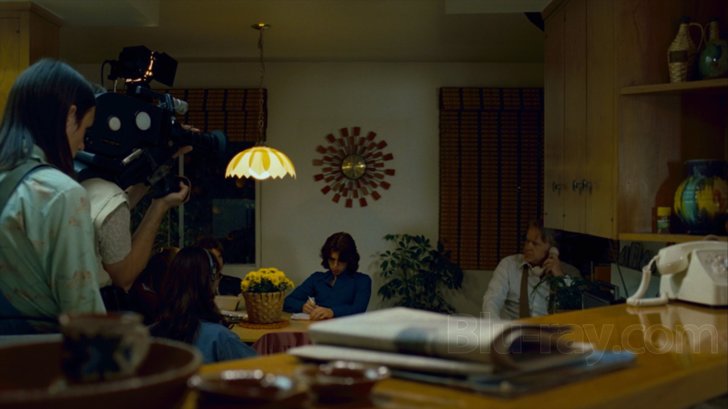
Bill Loud learns that his marriage is over.
The film opens in 1971, as producer Craig Gilbert (Gandolfini) has left his New York base of operations to find a suitable family for his project, which he has yet to convince his PBS bosses to fund. In Santa Barbara, he uses a local gossip columnist named Mary (Kathleen Quinlan) to pre-screen families for him. Among those she recommends are the Louds. When Gilbert and Mary have lunch with Pat Loud (Diane Lane), Gilbert senses something he likes. Whether personally or as a filmmaker is never clear. For Gilbert there may not be any difference. Bill Loud (Tim Robbins) sells mining equipment and is frequently away from home. When he returns from his latest trip, Gilbert meets him and the rest of the family: daughters Michelle and Delilah (Kaitlyn Denver and Caitlin Custer) and sons Grant and Kevin (Nick Eversman and Johnny Simmons), who play in a garage band. The only person Gilbert doesn't meet immediately is the eldest son, Lance (Thomas Dekker), who has just left for New York to pursue a life in the arts, but Gilbert says, no problem, they'll film him there. Popular legend has it that Lance "came out" to his mother during the course of filming An American Family, but in fact he never did so directly. It was just immediately obvious to anyone watching, and no doubt to Pat Loud (but not to Bill, whose capacity for self-deception seems to have been enormous), that Lance was gay. A scene occurs early in Cinema Verite's depiction of filming the Louds that is a harbinger of cultural developments to come. As the camera crew led by Alan and Susan Raymond (Patrick Fugit and Shanna Collins) follows Pat and Bill through a local mall, people they know gather from all around to congratulate them on their new celebrity, while the proprietor of a local women's boutique, Valerie (Lolita Davidovich), runs after Pat to offer her an entire ensemble, gratis, so that it will appear in the film. The Louds visibly brighten under the attention, and Cinema Verite thereby captures the easy allure of instant celebrity offered in exchange for letting TV (or the internet) exploit your life. It's a siren song every bit as potent, in its own way, as crack or heroin, and in the future it will be heard by millions. It's almost quaint now to listen to Gilbert and the Raymonds argue about "documentary ethics". The Raymonds, who were young, idealistic and themselves newly married, developed a close relationship with the Louds as they filmed day after day, while Gilbert remained in New York for lengthy periods reviewing the footage. From Gilbert's point of view, he had "embedded" the Raymonds so that, when something unusual or dramatic occurred within the family, the Louds would forget there was a camera present. For the Raymonds, Gilbert was exploiting the family's trust to obtain sensationalistic material for TV. Both had legitimate points, but I'd say Gilbert had the better argument. Having accepted the assignment to film whatever happened—to capture, as Alan Raymond says at one point, a cinema of "truth"—the Raymonds had forfeited the right to decide that some parts of the "truth" were not theirs to film. Shutting off the camera and walking away, as they do during one marital spat, was an irreversible editorial decision—and the Raymonds didn't have final cut. (As noted at the end of Cinema Verite, the Raymonds would go on to become Oscar-winning documentary filmmakers, while Craig Gilbert never released another documentary after An American Family. Make of that what you will.) Another flaw in Alan Raymond's "truth" argument is its failure to take into account the impact of the filmmakers' presence on the subjects being filmed. Like many marriages deemed picture-perfect, the Louds' is cracked just below the surface. The largest crack results from Bill's serial infidelities, including with Valerie, the boutique proprietor. In reality, Pat already knew of these incidents and had struggled to keep the marriage intact in spite of them. Cinema Verite takes the dramatic license of having Pat discover the truth about her husband during the filming of the documentary, because that makes it easier to explain her decision to end their marriage, which really did happen on camera. The filming of An American Family had placed more stress on the Louds' veneer of normalcy than it could possibly sustain. As they reveal in their commentary, directors Sheri Springer Berman and Robert Pulcini (American Splendor) did not know until post-production whether they could get the rights to use excerpts from An American Family in their film. They ultimately did, and these selections are sprinkled sparingly but effectively throughout Cinema Verite. Even without the clips, though, Berman and Pulcini would have had the film's conclusion, when the Louds embark on a campaign that would become the model for many subsequent denizens of reality TV who feel they've been treated unfairly: talk shows, interviews, a book contract. Contrasting the historical recreations with clips of the real Louds talking to Dick Cavett allows one to appreciate the extraordinarily accurate re-creation that Lane, Robbins, Dekker and their fellow actors achieved. It also confirms what pioneers the Louds turned out to be, although they had no idea that's what they were doing when they said yes to the pleasant, bearded man from PBS.
Cinema Verite Blu-ray Movie, Video Quality 
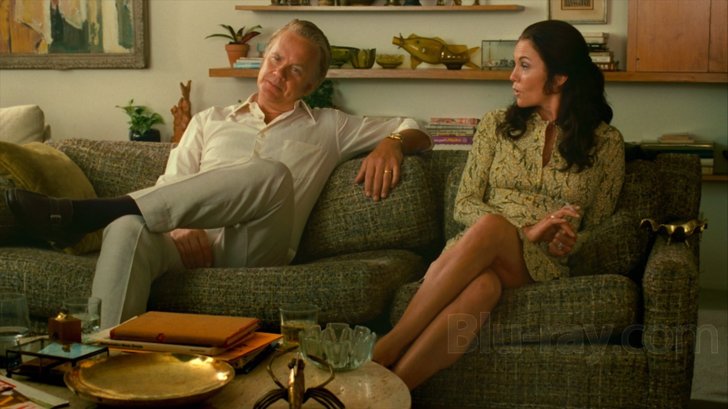
Cinema Verite was shot by Alfonso Beato (The Queen) using several different formats: 35mm film for the "standard" squences" and digital video for the recreated 16mm film being shot for An American Family (at 1.33:1 and centered in the screen), which was then processed in post-production for a pseudo-film-like look. These sources were then combined with 16mm footage from An American Family, and the entire creation was tweaked and harmonized on a digital intermediate. HBO's 1080p, AVC-encoded Blu-ray accurately reproduces the sun-drenched glow of the Santa Barbara scenes shot in 35mm (contrasted sharply with the cool, bluish hues of the New York scenes of Lance and of Craig Gilbert and his bosses). It's been too long for my memory to supply an accurate recollection of what An American Family looked like on TV sets of the time, but judging by the clips that have been included, the DV re-creations, with their weaker detail and oversaturated color, are an accurate approximation. The California scenes in 35mm are slightly brighter than the norm, but not at the expense of picture detail. The textures of faces, decor and clothing remain visible and finely etched. (Thankfully, the production design favored an accurate period recreation that doesn't verge into parody or exaggeration, which is all-too-easy to do with Seventies fashion.) Despite the glow that washes over everything, other colors shine through, and the glow recedes in the latter part of the film, as the Loud marriage deteriorates. I did not detect any inappropriate digital manipulation beyond the DI post-production adjustments; no detail stripping or artificial sharpening was evident, nor did I see any compression errors. This is a carefully modulated, film-like transfer, despite being made for a hi-def TV broadcast.
Cinema Verite Blu-ray Movie, Audio Quality 
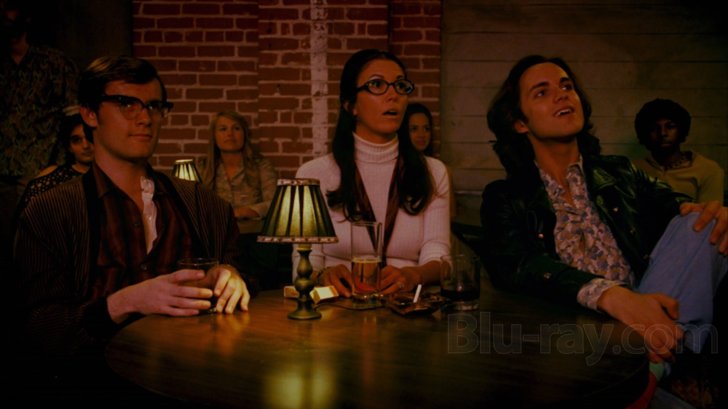
Cinema Verite's DTS-HD MA 5.1 track delivers a serviceable surround experience but not a showy one. The surround activity is limited to general ambiance and to supporting the fine underscoring by Rolfe Kent (Up in the Air). The more significant music, however, is the selection of period pop songs, which have been expertly chosen to complement the story, including the Mama Kass cover of "Dream a Little Dream", Carole King's "So Far Away", "Can't Find My Way Home" by Steve Winwood, Cream's "Tales of Brave Ulysses", "It Don't Come Easy" by Ringo Starr and The Who's "Won't Get Fooled Again", which is performed by the Loud sons' garage band.
Cinema Verite Blu-ray Movie, Special Features and Extras 

- Commentary with Directors Sheri Springer Berman and Robert Pulcini and Actress Diane Lane: The two directors and their star talk extensively about the filming process, their research, meeting the real people portrayed in the film, and their historical perspective on the events recreated (including the major change that brings Pat Loud's discovery of her husband's infidelities forward in time, for dramatic purposes). It's an informative commentary that illustrates how the creation of a film is at least as much about dealing with practical challenges (e.g., the technical nightmare of shooting the scene in which Gandolfini and Tim Robbins converse while driving along the coast in a convertible with loud surf on one side and roaring wind all around) as on efforts of imagination (how to convey Pat Loud's internal thoughts as she reaches the decision to end her marriage).
- The Making of Cinema Verite (HD, 1080i; 1.78:1; 3:32): Much more substantive than its brief running time would suggest, this "making-of" featurette provides a good introduction to both the film and An American Family.
Cinema Verite Blu-ray Movie, Overall Score and Recommendation 
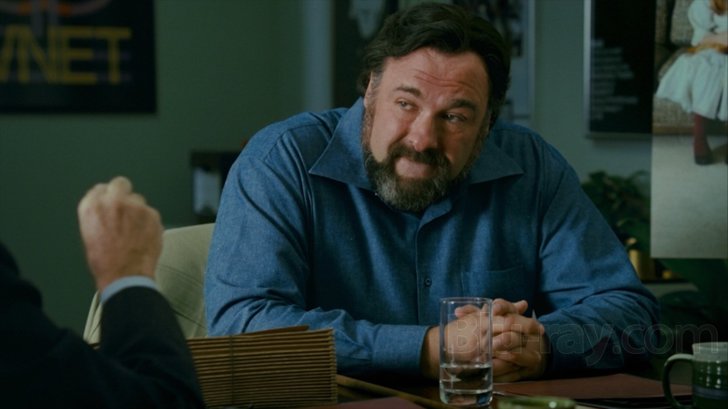
It is currently so difficult to obtain a complete version of An American Family that Berman and Pulcini had to view the Raymonds' personal copy. This is unfortunate, because the series is a crucial artifact from the history of television and American culture generally. Cinema Verite might provoke interest in a release, but in the meantime it serves as an introduction, abridgement and appraisal of this groundbreaking series. Highly recommended.
Similar titles
Similar titles you might also like

The Canyons
Slipcover in Original Pressing
2013

The Undoing
2020

The Nest
2020

The Believer
2001

Flesh and Bone
2015

Bright Lights, Big City
MVD Rewind Collection
1988

Big Fan
2009

Jolene
2008

About Cherry
2012

Hearts Beat Loud
2018

Shakedown
1988

Roger Dodger
2002

The Last of Robin Hood
2013

Such Good Friends
1971

Report to the Commissioner
1975

The Girlfriend Experience
2009

An Unmarried Woman
1978

Fleshpot on 42nd Street
The Girls of 42nd Street | Director's Cut
1973

Closet Monster
2015

Rebel in the Rye
2017